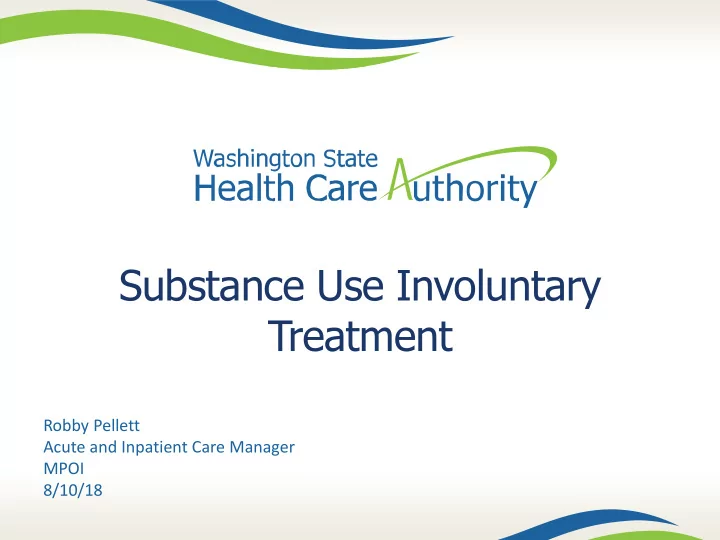

Substance Use Involuntary Treatment Robby Pellett Acute and Inpatient Care Manager MPOI 8/10/18
Involuntary Treatment Act Law • To protect the health and safety of persons suffering from mental disorders and substance use disorders and to protect public safety through use of the parens patriae and police powers of the state 2
Changes to the ITA Law • On April 1, 2018 ITA for Substance Use Disorders began. • Prior to this RCW 70.96A was the SUD ITA. • RCW 70.96B Integrated Crisis Response Pilot Project 3
What is SUD ITA • SUD ITA is now aligned with the Mental Health ITA law. • This change came into being with the passage of HB 1713 in 2016 4
Differences with Mental Health ITA • Can not use Single Bed Certifications • No loss of Gun Rights • Parent Initiated Treatment is available • Assisted Outpatient Treatment • Joel’s Law are able to be used for SUD ITA 5
• Who are the Designated Crisis Responders 6
Designated Crisis Responder Training • DBHR designed a 16 hour training to support DMHPs to become DCRs. • DMHPs had to have the DCR training in order to provide the ITA services to the community including SUD detentions 7
Involuntary Treatment • Evaluation and Treatment are available for both mental health and substance use disorders • Evaluation and Treatment facilities for mental health • Secure Withdrawal Management and Stabilization for substance use 8
Secure Withdrawal Management and Stabilization Facilities • Had to have 1 16 bed unit by April 1, 2018 • Care is on the level with an Evaluation and Treatment facility • Will have 9 facilities open by 2026 with 2 being for youth. 9
American Behavioral Health Services • Chehalis Secure Withdrawal Management and Stabilization has 21 beds • Spokane Secure Withdrawal Management and Stabilization has 24 beds 10
Future Secure Withdrawal Management and Stabilization Facilities • Commence funds • Behavioral Health Organization • Or Managed Care Organization • Department of Health • Health Care Authorization Division of Behavioral Health and Recovery 11
Detention Critieria • Due to a Substance Use Disorder the person is a – Danger to themselves (suicidal) – Danger to others (threats or harm towards others) – Danger to other’s property (harm to other’s property) – Danger of physical harm due to being gravely disabled • Lack of health and safety • Repeated and escalating loss of cognitive and volitional control 12
Front Door Evaluations • Eminent detention • Non-emergent detention • Assisted Outpatient Treatment – (All are court ordered treatment) 13
Guidance • A person does not have to be high to be detained for a substance use disorder ITA • Detained individuals will likely need medical clearance prior to acceptance by a facility • Must warn potential victims of threats of harm 14
Judicial Oversight • Same as the Mental Health detentions except for Long Term Commitment due to lack of facilities. • End of 72 hours for 14 day petitions • End of 14 days for 90 Less Restrictive Alternative petitions 15
Revocation of an LRA • Individuals on 90 LRA can be revoked back to a Secure Withdrawal Management and Stabilization facilities. • Unfortunately there is no identified Long Term SUD involuntary treatment provider currently identified. 16
SUD LRAs • Must have an accepting SUD LRA outpatient treatment provider. • To provide a care coordinator • Must have an appointment for intake • Must have a Treatment plan for the court • Must have a plan for transition to voluntary care • Must have a crisis plan 17
Questions? More Information: SecureSUD@hca.wa.gov Robby Pellett, Acute and Inpatient Care Manager MPOI peller2@hca.wa.gov Tel: 360-725-3472 18
Recommend
More recommend